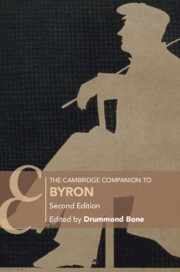Book contents
- The Cambridge Companion to Byron
- The Cambridge Companion to Byron
- Copyright page
- Contents
- Notes on Contributors
- Preface
- Chronology
- Abbreviations
- Chapter 1 Byron’s Life and His Biographers
- Chapter 2 ‘My Pen Is at the Bottom of a Page’
- Chapter 3 Byron’s Politics
- Chapter 4 Byron: Gender and Sexuality
- Chapter 5 Heroism and History
- Chapter 6 Byron and the Eastern Mediterranean
- Chapter 7 1816–1817: Childe HaroldIII and Manfred
- Chapter 8 Byron and the Theatre
- Chapter 9 Byron’s Experiments in Drama: 1820–1822
- Chapter 10 Childe Harold’s Pilgrimage iv, Don Juan, and Beppo
- Chapter 11 Redeeming Levity
- Chapter 12 The Vision of Judgment and the Visions of ‘Author’
- Chapter 13 Byron’s Bear and Other Animals
- Chapter 14 Byron’s Lyric Poetry
- Chapter 15 Byron and the Eighteenth Century
- Chapter 16 In Byron’s Wake
- Chapter 17 Byron, Postmodernism, and Intertextuality
- Chapter 18 ‘Writing Grows a Habit’
- Select Bibliography
- Index
- Cambridge Companions To Literature
Chapter 5 - Heroism and History
Childe Harold i and ii and the Tales
Published online by Cambridge University Press: 02 November 2023
- The Cambridge Companion to Byron
- The Cambridge Companion to Byron
- Copyright page
- Contents
- Notes on Contributors
- Preface
- Chronology
- Abbreviations
- Chapter 1 Byron’s Life and His Biographers
- Chapter 2 ‘My Pen Is at the Bottom of a Page’
- Chapter 3 Byron’s Politics
- Chapter 4 Byron: Gender and Sexuality
- Chapter 5 Heroism and History
- Chapter 6 Byron and the Eastern Mediterranean
- Chapter 7 1816–1817: Childe HaroldIII and Manfred
- Chapter 8 Byron and the Theatre
- Chapter 9 Byron’s Experiments in Drama: 1820–1822
- Chapter 10 Childe Harold’s Pilgrimage iv, Don Juan, and Beppo
- Chapter 11 Redeeming Levity
- Chapter 12 The Vision of Judgment and the Visions of ‘Author’
- Chapter 13 Byron’s Bear and Other Animals
- Chapter 14 Byron’s Lyric Poetry
- Chapter 15 Byron and the Eighteenth Century
- Chapter 16 In Byron’s Wake
- Chapter 17 Byron, Postmodernism, and Intertextuality
- Chapter 18 ‘Writing Grows a Habit’
- Select Bibliography
- Index
- Cambridge Companions To Literature
Summary
This chapter argues that the first two cantos of Childe Harold and the Turkish Tales can be read as a sustained critique and questioning of a teleological history, or a history impelled by the acts of great men and heroes. It suggests that these poems engage with the intellectual crisis precipitated by the Napoleonic wars and a devastated Europe in different ways, representing a broad alienation from the meaningful progress of history both within and beyond European borders. Understanding Byron’s distinctive romanticism as primarily political rather than ontological, the chapter reads this group of poems as being charged with a late-enlightenment scepticism representative of a new freedom of thought in which there are no structural possibilities for history, and through which heroic acts are rendered ever more remote from civilisation’s improvement.
- Type
- Chapter
- Information
- The Cambridge Companion to ByronSecond Edition, pp. 69 - 90Publisher: Cambridge University PressPrint publication year: 2023

